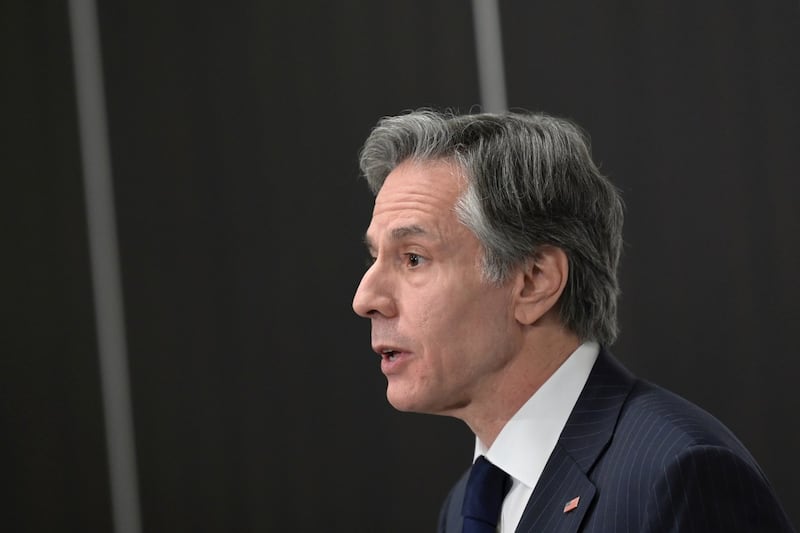Repressive governments and groups that misuse technology to foment hate and violence are the biggest threats to press freedom and democracy today, media professionals said Wednesday during a panel discussion ahead of this week’s United States-hosted democracy summit.
Panelists, including 2021 Nobel Peace Prize-winning journalists Maria Ressa and Dmitry Muratov, also spoke about the threat to journalists’ lives in an atmosphere where criticism isn’t tolerated and where big technology companies often allegedly work at the behest of governments.
In the “new information ecosystem, the old gatekeepers, journalists, have just been replaced by the new gatekeepers, technology,” Ressa, a Filipino journalist and chief executive of the Rappler news website, said at the online panel titled “Media Freedom and Sustainability.”
Technology is now “governing our lives, governing our perception of the world, governing our shared space,” Ressa added.
This supremacy of technology is “unprecedented” and now governments are using it to target journalists who criticize their policies, she said.
Ressa has first-hand knowledge in this area.
In June last year, she and a former colleague were convicted of cyber libel. Press freedom activists said the two were targeted for Rappler’s critical coverage of President Rodrigo Duterte’s five-year war on illegal drugs, which has left thousands dead. Duterte accused Ressa of spreading “fake news.”
Ressa and her colleague face up to six years in prison – they are currently free on bail pending an appeal. She recounted the grim fate of the last journalist who won a Nobel Peace Prize.
“The last time a journalist was given the Nobel Peace Prize was in 1936. And Carl von Ossietzky never got to Oslo [to receive the prize]. He languished in a Nazi concentration camp,” Ressa said.
Muratov, the Russian Nobel-winning journalist, said reporters in his country often are called “foreign agents” and “enemies of the people.”
This is a “shameful stigma, which is becoming fatal for our profession,” he said, highlighting the danger they expose themselves to in pursuing the truth.
Since its launch two decades ago, Muratov's newspaper, Novaya Gazeta, has repeatedly written about alleged corruption in the Russian government – and many link that to the killings of six of the paper's reporters.
Muratov said at the panel that the journalism profession was associated with extreme risk. Meanwhile, he said, “digital giants come under the influence of governments, and many of them edit content at the direction of governments.”
The panel was held on what was called “Day Zero” of the virtual Summit for Democracy, scheduled to be held Thursday and Friday, and convened by U.S. President Joe Biden. The Philippines’ Duterte and Indonesian President Joko “Jokowi” Widodo are scheduled to attend from Southeast Asia.
‘Explicit retaliation’
Meanwhile, Bay Fang, the president of Radio Free Asia, with which BenarNews is affiliated, spoke about the means used by repressive governments to silence the media.
These governments “have used different means to try to silence us over the years, going beyond traditional physical threats, and jailing, but also weaponizing legal systems, using cyber intimidation, and extending their influence beyond their borders by targeting families and loved ones,” Fang said at the panel.
Around 50 family members of the Washington-based RFA Uyghur Service’s reporters have been jailed, detained, or are missing in China, Fang said.
This is “in explicit retaliation” for the reporters’ journalism bringing to light the brutal treatment of millions of Uyghur and Muslim minorities, the existence of the detention camps, and the creation of a surveillance state, Fang added.
“And we’ve seen these tactics spread throughout Asia in recent years, with governments seemingly empowered by the lack of accountability for their actions double down on traditional brute force intimidation,” she said.
“Freedom of the press is not an end in and of itself. It’s a way to enlighten and empower people to make their own decisions no matter where they live.”

U.S. Secretary of State Antony Blinken speaks at a press conference during an Organization for Security and Co-operation in Europe meeting, in Stockholm, Dec. 2, 2021. [AP]
US Announces 3 New Funding Initiatives
United States Secretary of State Antony Blinken, who also appeared on the panel, praised the “extraordinary work of journalists and media workers” worldwide, including Ressa and Muratov.
“And yet, as we all know, for too many journalists, doing this work means having to endure threats, harassment, attacks,” he said.
The top U.S. diplomat also announced three new funding initiatives to protect reporters and support independent international journalism worldwide.
The U.S. is launching a new liability fund to provide financial support for reporters and news organizations that are targeted with litigation as a result of their reporting, Blinken said.
“In addition, USAID will announce the launch of a Media Viability Accelerator, which will bring together media outlets, business advisory groups, and the private sector to make independent press outlets more sustainable,” he said at the panel.
“We will [also] make the biggest contribution by any government to the recently launched International Fund for Public Interest Media … that provides assistance to at-risk independent news outlets.”
Reported by BenarNews, an RFA-affiliated online news service.
